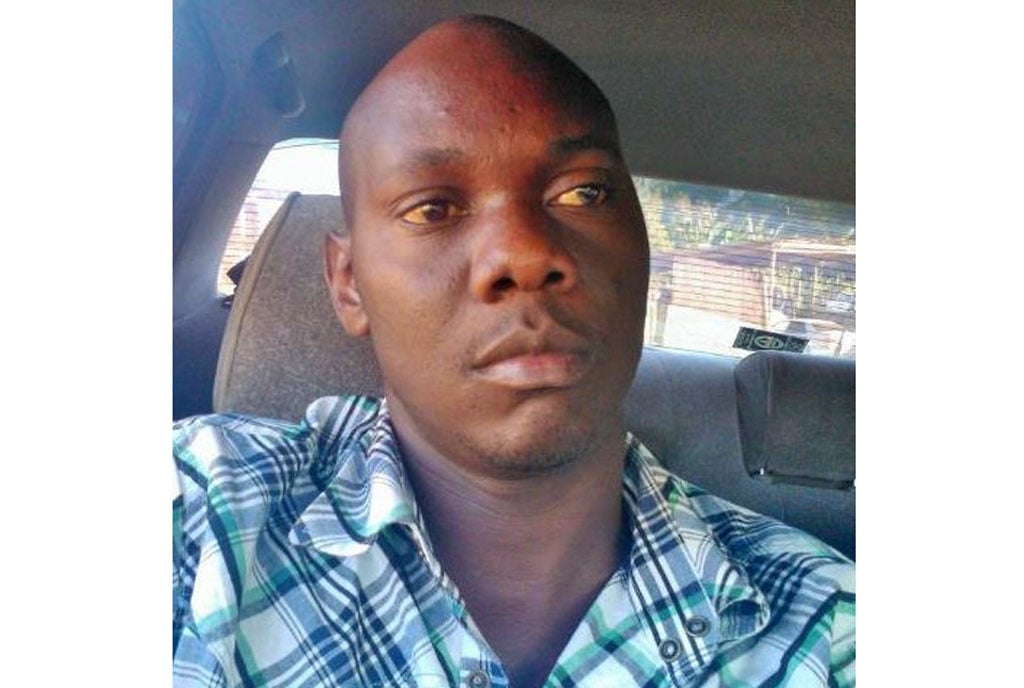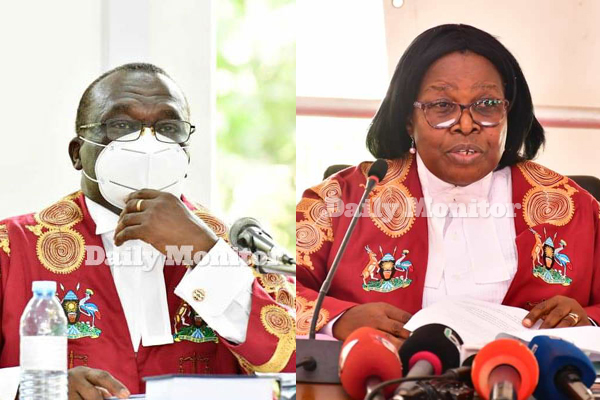Prime
Justice Kisaakye blames her woes on witch-hunt

Justice Esther Kitimbo Kisaakye and Judiciary PS Pius Bigirimana. PHOTO/FILE
What you need to know:
- The judge argues that in her 12 years as a senior judge, she has never encountered a situation where one of them had to account to the Judiciary’s Permanent Secretary.
Supreme Court Judge Esther Kitimbo Kisaakye has said she is a victim of “witch-hunt … discrimination” masterminded by individuals both within and outside the Judiciary, her employer.
In a three-page rejoinder to an earlier letter by Judiciary’s Permanent Secretary Pius Bigirimana, communicating intended freezing of pay to the judge, Justice Kisaakye noted that the directive contravened the constitution and the principle of fair hearing.
In a July 1 internal memo, Mr Bigirimana said he was in receipt of information from an undisclosed source that Justice Kisaakye had not worked for nine months and tasked her to show cause as to why she should still be paid.
He also demanded an explanation within 14 days why the official payments made to the second most senior judge on the bench after the Chief Justice over nine months should not be recovered.
Justice Kisaakye earns about Shs34m tax-free in salaries and allowances a month, and is reported to have been on official leave since last September.
“It has been brought to my attention that since September 2021 when you returned from your medical leave, you never reported to work nor sought leave granted from your superviser. This is a serious matter which I, as accounting officer, has picked interest [in],” Mr Bigirimana wrote to Justice Kisaakye on July 1.
He added: “The purpose of this memo is to humbly request you to show cause as to why I cannot recover nine months’ salary which has been paid to you without working. Please take note that I am giving instructions not to process your salary starting with the month of July 2022 until a satisfactory explanation is offered. If I don’t receive the explanation sought within 14 working days, I will proceed to recover all the funds remitted to you in form of salary starting with the month of July.”
In a July 14 rejoinder, Justice Kisaakye questioned the constitutionality of Mr Bigirimana’s intended action and dismissed the claims against her as baseless.
“I am totally surprised and amazed that a person entrusted with your responsibility ignored clear constitutional provisions and official records about my work, health and leave entitlements, all of which are readily available and accessible within; your office, my supervisor’s office, the office of the commissioner, human resource in the Judiciary, Supreme Court and Medical Board, which are also accessible nationally and internationally …and instead chose to tarnish my good name, reputation and record based on hearsay,” she wrote.
Justice Kisaakye, who laboured her qualifications in her letter, including specifying that she is a holder of a doctorate degree from the American University in the United States, noted that “my command of the law should not be in question”.
“Please, also note that your directives and intended actions contravene the Constitution, which among others, entrenches all the tenets of judicial independence and the right to a fair hearing even to the lowest serving officer to the Judiciary, the entire public service and all persons,” she added.
Based on official figures, our computation shows that the amount that Justice Kisaakye earned from the government over the past nine months in salaries and allowances, which PS Bigirimana seeks to recover, grosses Shs306m.
In her three-page rejoinder, copied to, among others, the Chief Justice, the Deputy Chief Justice, the Principal Judge, and the Chief Registrar, Justice Kisaakye said she had in the 12 years of working as a senior judge never encountered a situation where one of them had to report, or account, to Judiciary’s permanent secretary.
“If the law has recently been changed, I would be grateful if you could provide me with a copy thereof and/ or the regulations requiring this report and also copies of reports submitted by my colleagues at the court who have already complied with this new requirement, for information and my guidance,” she wrote.
She added: “Contrary to your baseless allegations, my supervisor (Chief Justice) has always been and is currently fully aware of my output since September 2021 and my subsequent absence from office since I returned to the country.”
We were unable yesterday to speak to the Chief Justice to independently confirm this version rendered by Justice Kisaakye to the Judiciary’s permanent secretary.
The exchanges of the letters happened in the first month of the new financial year, and we were unable yesterday to establish whether or not PS Bigirimana made good on his plan to freeze pay to Justice Kisaakye considering, as detailed in the rejoinder, that she rejected the demands.
In her reply, the judge suggested she followed the right procedure and the PS should instead hold accountable some unnamed officials of the Judiciary who may not have complied with, and completed, requisite formalisation.
“The questions [that] you are now asking me,” Justice Kisaakye noted, “should be directed to the relevant Judiciary officials who, for reasons best known to themselves, declined to execute their responsibilities and I cannot be blamed for their failure to do their work.”
Asked yesterday about the judge’s counter-claims, PS Bigirimana said: “I have no response”.
We first published a story about the row involving the highest appellate court of the land in our Sunday edition, and the PS in the July 1 letter and interview for our article said he was proceeding under Article 164 and 174 of the Constitution.
The supreme law and subsidiary legislations, he said, command him to account for all funds appropriated under his charge.
He said accountability means that there should be full disclosure of how funds appropriated by Parliament have been utilised.
“I also invite you to Section 45 of the Public Finance Management Act which requires the accountability officer to ensure that there is value for money appropriated and released to any entity,” Mr Bigirimana added.
The unfolding fall-out in the Supreme Court last week caught the attention of the International Commission of Jurists (ICJ), which in a statement raised a concern about allegations of what it called “arbitrary” and “unfair treatment” of Justice Kisaakye.
The commission, which comprises 60 eminent judges and lawyers across the world and legal systems, warned that the matter could affect the independence of the Judiciary.
In its August 30 statement, ICJ noted that JusticeKisaakye had lately been subjected to disciplinary proceedings by the Judicial Service Commission (JSC) without proper notice or due process given to her.
“ICJ has received reports indicating that a disciplinary inquiry was initiated by the Judicial Service Commission (JSC) following Justice Kisaakye’s decision to deliver her dissenting judgment in one of the 2021 presidential election petitions,” the ICJ’s statement read in part.
We could not independently verify this claim and no official of the Judiciary, or JSC, has linked demands placed on Justice Kisaakye regarding remuneration to her dissenting judgment in Robert Kyagulanyi, alias Bobi Wine’s, unsuccessful petition to overturn President Museveni’s re-election early last year.
The international jurists called for respect of Justice Kisaakye’s legal rights.
Background
On March 18 last year, drama played out at the Supreme Court when Justice Esther Kisaakye alleged that the Chief Justice ordered her file to be confiscated prior to her lonereading of a dissenting presidential election petition verdict. The judges pronounced themselves (8:1) after National Unity Platform) party’s Robert Kyagulanyi, aka Bobi Wine, withdrew his petition to challenge Yoweri Museveni’s victory.
Other Supreme Court justices skipped the March 18, 2021 session during which Justice Kisaakye read her judgment, largely to the media, and after the court’s public address system suddenly went off. Chief Justice Alfonse Owiny-Dollo dismissed those claims against him, explaining that all the court files were taken to the court’s boardroom and that it’s not true that he confiscated Justice Kisaakye’s file as alleged.
Bobi Wine, who garnered 35 percent of the valid total votes, ran to court on February 1, 2021, accusing the Electoral Commission of fraudulently declaring Mr Museveni as winner of the January 14 ballot (after bagging 58 percent of the valid votes). The Opposition leader had accused President Museveni of bribery, intimidation, ballot-stuffing and sponsoring violence, which resulted in arrests and death of Opposition supporters during the election process.
Bobi Wine, however, prematurely withdrew the petition, citing a number of hurdles, including his lack of faith in the Judiciary to be impartial.





